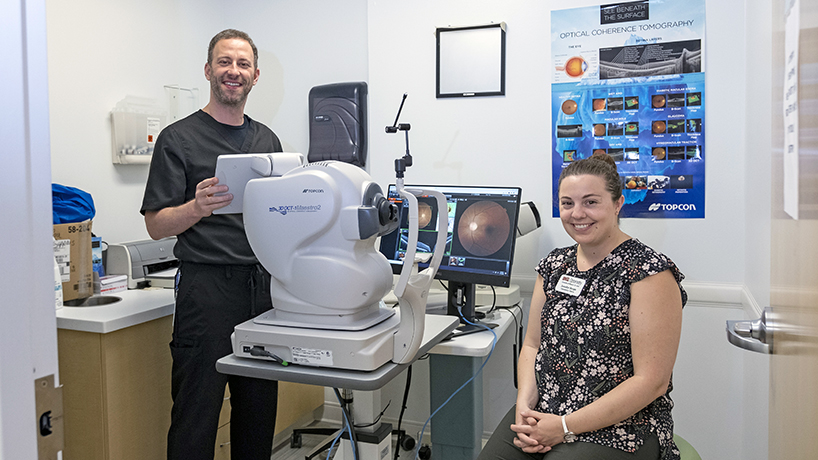
Assistant Clinical Professor of Optometry Tareq Nabhan (left) and optometry student Jennifer Bergie with a Topcon Maestro 2 that the College of Optometry provided for Affinia Healthcare. A partnership between the university and the federally qualified health center brings fourth-year optometry students and professors to downtown St. Louis to fill a health care gap for uninsured and underinsured patients. (Photo by August Jennewein)
There are these magical moments in optometry when patients put on glasses for the first time and can finally see.
Being able to restore vision – that’s powerful.
But the fourth-year students in the College of Optometry at the University of Missouri–St. Louis who rotate through Affinia Healthcare gain something immeasurably more.
“They see the impact that you can make with your degree, that you can have on someone’s life with the profession,” said Dr. Tareq Nabhan, assistant clinical professor of optometry. “You can change the trajectory of someone’s entire health by being a part of the equation as a community-based optometrist.”
Affinia is a federally qualified health center with six locations that provide comprehensive primary and preventive health care. The center helps fill a need for an underserved population; In 2019, Affinia provided 191,901 service encounters to nearly 45,000 unique patients – 90 percent of those served were below the federal poverty line, 45 percent were uninsured and nearly 10 percent were homeless.
In the downtown St. Louis location, the College of Optometry runs the center’s eye clinic, which is staffed by UMSL faculty members and optometry students, who spend their final years in a series of externships. The relationship with the center typifies UMSL’s anchor institution initiative by serving a pressing community need while providing students with opportunities for gaining knowledge and experience.
“UMSL is good at giving back to the community, from doing vision screenings at the surrounding schools, even to the clinic on campus,” said optometry student Jennifer Bergie, who recently wrapped up her rotation. “Affinia is one more place to do that. It feels really good to give back, and the patients are very appreciative.”
UMSL places three students at a time at Affinia for two-month rotations. Under the supervision of attendings such as Nabhan, the students perform eye exams and then present their findings.
Because Affinia offers a wide scope of services, the students get a unique learning experience.
“What I really like about Affinia is that it’s a multicenter health care center,” Bergie said. “There’s optometry, there’s dentistry, there’s pediatrics, family care. A lot of the patients I saw were diabetic or had high blood pressure. Many times, those kinds of diseases can also have major appearances in the eyes.
“So, for instance, if a patient came in and their diabetes was a little bit out of control, I was able to quickly send that patient to go see their primary care doctor or to go get some lab tests done.”
Being able to provide holistic care is a valuable professional experience for the students and is helpful in treating patients who might not be able to afford regular care. Bergie noted that she learned to take in-depth patient histories, though she otherwise approached care the same as at any other location.
“When we see patients, you can treat holistic issues right then and there,” Nabhan said. “But there are often other issues, such as uninsured status, limited transportation, language barriers and even the awareness of available resources and support. At Affinia, well-established systems in place provide patients access to social services wherein qualifying patients can be issued health care insurance or grant assistance towards their health care and well-being. With said services and much more, Affinia provides an environment not only to manage disease, but to prevent it.”
In order to help make the care affordable for patients, the center charges on a sliding scale and accepts a wide range of health insurance that stretches from Affordable Care Act plans to Medicare to conventional insurance. Affinia also charges a flat fee of $60 for glasses.
In addition to staffing the eye clinic, the UMSL partnership has also helped bring new technology to the downtown center, including most recently a Topcon Maestro 2, a combo optical coherence tomographer-retinal camera machine, which reveals the cellular structure of the eye and helps with diagnoses such as glaucoma, diabetic retinopathy, cataracts and much more.
“It is allowing us to care for our patients on a higher level, and although not initially for COVID, its utility is certainly reducing transmission risk while maintaining standards of care,” Nabhan said. “We are appreciative of Dean Davis’s commitment to higher learning and patient care through technology.”
Additionally, he is grateful to Affinia’s leadership team, including Dr. Alan Freeman, Dr. Melissa Tepe, Dr. Kendra Holmes and Yvonne Buhlinger, as well as the students, residents and clinicians that serve there.
Nabhan is also working to develop a telehealth course for the College of Optometry, which he sees as being useful for UMSL and community partners both during the pandemic and afterward.
Those efforts fit into the overall purpose of Nabhan’s work, which is focused on democratizing education and health care by bringing new optometric technologies to the classroom and to rural locations both in the U.S. and beyond.
“Often, you just kind of go with what feels good,” he said. “But I’ve been forced to think about purpose. What is this all about? I’m not a philosophical guy, but when I think about purpose and reflect on how I’ve used my time, I find unmatched personal and professional value from the times I served those in need. I continue to pivot myself to fill in the many gaps that exist in healthcare access, equity and awareness.”














